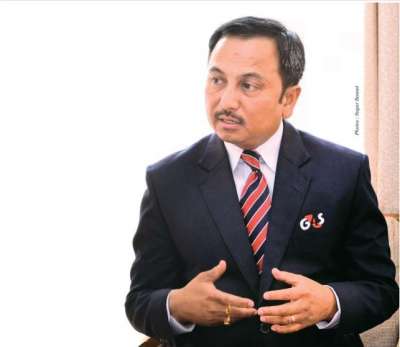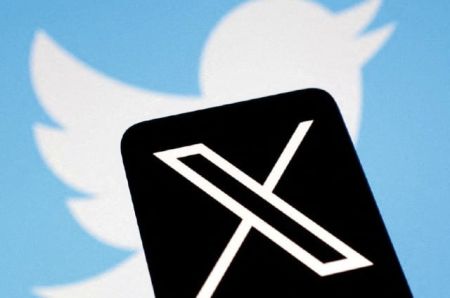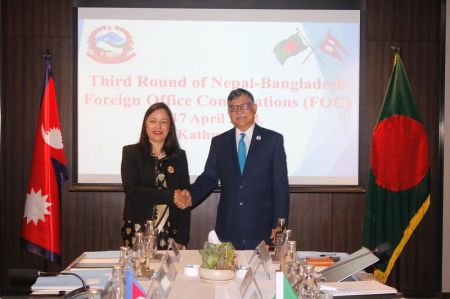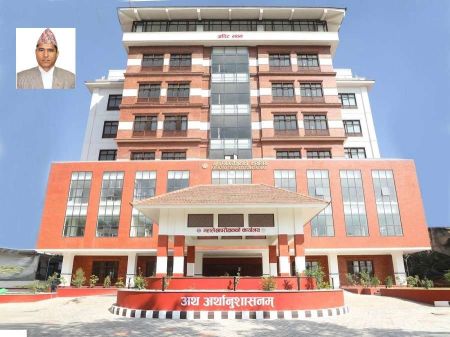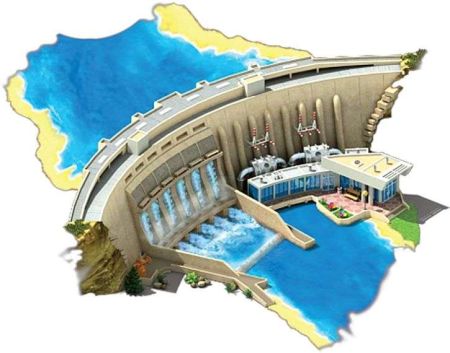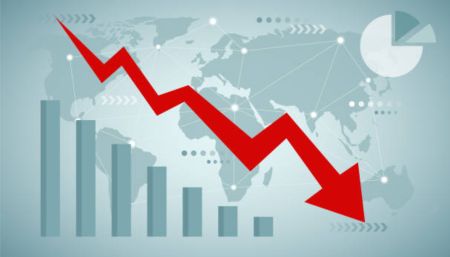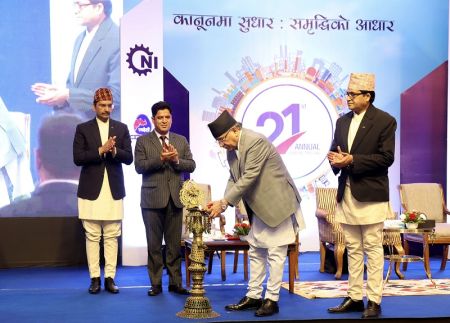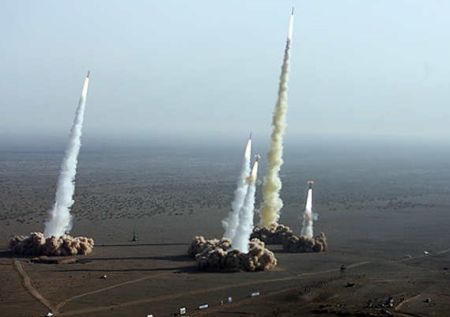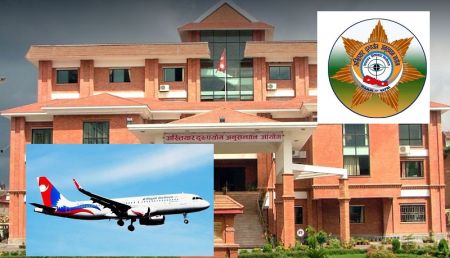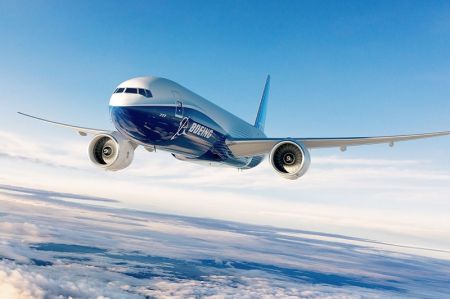We Have To Work According To Consumer Psychology’
.jpg)
Salman Latif Rawn
Country Manager, Nepal
Coca-Cola Sabco
Salman Lafit Rawn is the country manager of Coca-Cola franchise in Nepal since January 2012. Prior to joining Coca - Cola, he had worked in the capacity of the General Manager at Pepsi Cola franchise Iran. He has also worked as the Country Manager at Alokozay Group of Companies in Dubai – UAE . From 2005 to 2007 he was with coca-cola company managing its franchise in Afganistan in the capacity of Country General Manager. An MBA Graduate from the institute of Business Administration in Lahore, Rawn has more than 25 years of extensive and successful experience in the Fast Moving Consumer Goods (FMCG) industry. In an Interview with New Business Age Rawn shared the expansion and investment plans of his company for Nepal and also shed light on the existing challenges. Excerpts:
We have heard about the massive expansion plan of Coca-Cola in Nepal. Would you like to shed light on it?
The Coca-Cola Group has been working on the expansion of the available categories of its beverage. Right now, we are only doing the Returnable Glass (RGB) and PET business categories. We are investing 23 million USD in a new plant in Terai this year which will be the group’s largest single-time investment in Nepal so far. Internationally, we have many areas where we work in, for example, juice, water and energy drinks. Taking into account the uniqueness and demand of this market, we are planning to introduce some of those products here in the coming years.
It’s tough bringing investment in Nepal or convincing people for funding, especially when the political and business environment is not very constructive. However, we have managed to bring investment this time and we are hopeful that if we could use it well, we could bring in more money for this country.
What can be the positive outlook for this investment?
If we are making profit from this country, we also have to return something to it. There will be new expansions in terms of investing in the plant and machines and it will create new employment opportunities for people. Besides, we will be contributing more to the government exchequer. Nepal is a landlocked country where we need to import most of the raw materials which means that more money will go to the government coffer in the form of Customs Duty or Value Added Tax (VAT)
I believe that Coca-Cola has not introduced a wide range of products that are available in many other countries. What are you doing in this regard?
Coca-Cola has a wide range of products. Unfortunately, the size of the market is too small to produce all of those products in Nepal. Putting up a manufacturing facility for everything produced by the group will be highly capital intensive. However, we are trying to bring machines which can produce multiple products. Another constraint for this is the per capita income of the Nepali people which is very low. An ordinary Nepali citizen would not spend much on beverages. We are more dependent on tourists and their consumption trend. But this does not mean that we will not introduce any new products in Nepal; we will first import a new product range in Nepal from our plants in the neighbouring country. If we see demand for those products in the market, we will then accordingly set up the manufacturing plant here. We can introduce juice, water and energy drinks and add more flavours to the existing products in the future.
Though the per capita income of the Nepalis is still low, the distribution system for products like beverages has expanded in Nepal in recent years due massive expansion in road network. Has not this development in infrastructure helped in increasing the business prospects?
These aspects are not enough because we have to work according to consumer psychology. It has been discovered through our consumer researches and direct discussion with the consumers that people living in European countries and Western territories don’t limit their beverage consumption only to events or family gatherings. It is part of their regular life as well whereas in Nepal, there is still a trend to consume beverage during particular events and festivals or in the presence of guests. The per capita soft drink consumption of the Nepalis is less than eight bottles a year in comparison to other South Asian countries where it is anywhere from 24 to 48 bottles a year. It will certainly be safe for us to introduce new range of products as and when Coca-Cola becomes a part of the Nepali people’s everyday lives.
Coca Cola enjoyed 70-80 percent of market share in Nepal till a few years ago. That figure is now reduced to 66 per cent due to aggressive marketing from the competitor. What are you doing to regain the lost market share?
I have worked in markets where we had as much as 92 per cent market share. But these percentages are not attainable when there are two competitive companies operating in the same market. The reality is that when two companies are working competitively, market shares settle down somewhere between 60 and 40. I have worked both with Pepsi and Coke and I know where the market share of Coke is higher than Pepsi or vice-versa and what are the reasons behind it. Our objective behind expansion and investment is to have greater market share and product availability during the peak season. If my production capacity does not allow me to reach everyone during the peak season when they want to consume my product, people will not consume my products in the future. It’s because that opportunity will be grabbed by someone else. So we are trying to regain that lost opportunity which someone else has grabbed. And the moment we have that, the lost market share will automatically come back to us.
What are Coca-Cola’s marketing strategies in Nepal that has helped the brand to maintain its market leader position?
Multinational companies implement different marketing strategies at different locations. Despite having a vast range of products in their portfolio, they do consider various aspects for example, which market to go, when to go, what amount of market maturity to seek etc before launching their products. You might find some products in Nepal that are imported in the quantity of thousands or hundreds. However, when it comes to manufacture those products here, it is imperative to justify the required investment. It is the same with us so we are waiting for the right time to introduce additional products.
Bottlers Nepal – the Nepali bottler of Coke – had won the Country of the Year Award in 2010. When next can we expect a similar feat from Coca- Cola’s Nepal operation?
We bagged the ‘Country of the Year Award’ continuously for two years in 2009 and 2010. There are nine countries in the group now and all of them compete for this award. Surely, there are countries that have advanced technologies such as South Africa. There is Sri Lanka, Uganda, Ethiopia and we are competing with all of them. But even this year, we won two awards— Employee Engagement Award and Best Water Usage Award. We are competing again and hope to get the Country of the Year Award in the coming years.
How has the ongoing financial crisis affected the soft drinks market in Nepal?
We, or for that matter, any other FMCG companies have been seriously affected on two counts. First, with all those days of closures, the production has been disturbed. Second, the distribution of the product has become very difficult. Continuous bandhs have affected our transportation system adversely and a weak transportation mechanism impacts our production system as well. We produce less when there isn’t enough transportation facility available. When we produce less, the cost per case goes high and it affects us as producers as well as the consumers.
What kind of challenges do you see in your job in the Nepali market?
Electricity is a very big challenge because we are in a business where products are best served when they are chilled. We have distributed refrigerators to the outlets in the market but they cannot sell chilled drinks due to power outage. Another challenge is gasoline or diesel prices which increase every couple of months or so. At the same time, we can’t increase the price of our products to adjust accordingly. The frequent hike in petroleum prices also makes it difficult for us to decide on our annual budget. The third biggest challenge is the dollar rate fluctuation which has been impacting us heavily as we have to import 90 per cent of the raw material that we use.
Is that the reason for you to reduce your advertising budget?
We have not reduced our advertising budget as such. We have rather changed the focus of our advertising campaigns. For example, if there is lesser electricity, the people will be watching television for a lesser duration of time. So we thought of diverting our investment from electronic mediums to advertising through hoarding boards that are more visible and do not get impacted by power outage. You can see increased number of such hoarding boards in the Kathmandu Valley when you move around. There is hardly any main road where Coca-Cola is not present so it’s just a shift of focus.
How do you view the present competition in Nepal’s soft drink market?
There are two major categories in the Carbonated Soft Drink (CSD) industry —water and flavoured drinks. There is no ‘A’ Class player in water so far in Nepal which is dominated by a few local brands available in the market. However, there is a competition between two players in the flavoured drinks category. Our competitor is trying to build a market for itself and so are we. But the good thing is that our share of the market pie becomes bigger with the growth in the market size. I could see that as an industry, we are less dependent on trying to eat each other’s pie. Instead, we are trying to increase the total size of the market. The fight between the two companies was stringent in the past but it is not the same anymore because a person working for Coca-Cola today can work for Pepsi tomorrow and vice-versa. At present, the fight is more indirect for example; it is for the space in the outlets. The general size of our grocery shops is small so it’s not just the soft drinks producers but the entire FMCG industry that is jostling for space in the outlets.
It is said that one of the major problems in the Nepali market is that of arrears in collection of dues from the distributors. How is your experience?
We don’t have such issues. I have also talked with other FMCG companies and even they are not operating on credits. However, I don’t say that we don’t have any arrears at all. There are credits in the market but these are secure credits. Our distributors are working with us for a reasonable period of time so there is a certain level of credibility in our relations. If we realise that a distributor or distributing channel might land us in troubled waters, we prefer not to extend any unsecured business with them.
Bottlers Nepal has increased its spending on CSR activities in recent years. Can you tell us about the new CSR activities that are being planned?
I could see a huge chunk of activities this year coming under our CSR initiatives apart from our regular activities. We have been working on water utilisation, plantation and education and we have also been sponsoring certain orphanages. Our new project is to extend support to women entrepreneurs so we have adopted a vision “5 BY 20” which is a commitment to empower 5 million women to turn successful entrepreneurs by the 2020. Nepal has also been selected for the project from the South-West Asia Region. A senior person representing the Director level of the India Division of the Coca- Cola Company will be visiting Nepal next week to explore the details of the campaign. The Senior Vice President of the division will accompany him and together they will be setting different criteria. The criteria will entail aspects like who can qualify, what can be the measures to qualify and what will be an appropriate form of support for women entrepreneurs etc. Another project which we are going to introduce is ‘Support My School’. It is about kids who run away from schools, are not interested in study and do not have access to studies. This big campaign will be looking at ways to help them through uniforms, books, building libraries and classrooms etc.
As a global operator, what are the challenges you face in a country like Nepal?
Nepal is among the very few countries in the world which are landlocked. It does not have much of its own revenue generation. To analyse how much people can buy from us and what things they will be interested in, we will have to watch their source of revenue. Like I said earlier, the smaller base of the country, lack of electricity and diesel, and dollar rate fluctuation are the major challenges in bringing big investment to this country. Another problem is that of finding the right people to work because the Nepali industry is small. Had there been multiple industries, there would have been a bigger pool of human resource to choose from.
What kind of government support are you looking for?
The government should see the quantum of direct or indirect taxes and exchequers that we are paying. If it increases the excise duty or other duties at a very abnormal rate to industries like us, bringing investment to this country and creating opportunities for employment will be difficult. We are trying to expand our business so we need facilitation in technology and computerisation from the government. We will not be able to bring investment to this country if we have to wait years-on-end for approval on bringing software and technology. At present, we are trying to bring in a software called SAP and it’s already been a year since we applied to the Inland Revenue Department for the approval. Our application is simply gathering dust there. SAP will enable our headquarters to evaluate our work and access our records through our central server. It is easier to operate when this system is installed and therefore, we have been requesting the government to approve our application. We are not the first company in Nepal to use this software as there are some other companies that are already using the same technology. We have explained this to the government authorities but they told us to wait for the permission. We have met the concerned officials and satisfied all their queries but there is no progress so far. How can we bring more technology and investment in this country if the government does not facilitate manufacturing industry with the required technologies? It is our sincere request to the government to do the needful and approve our application on the SAP software.


